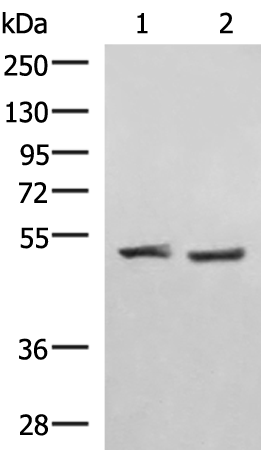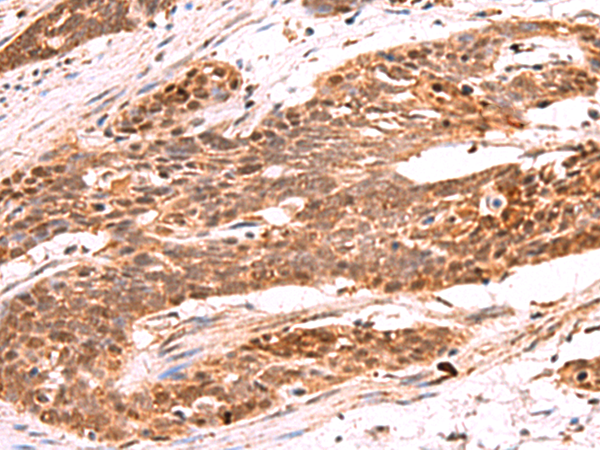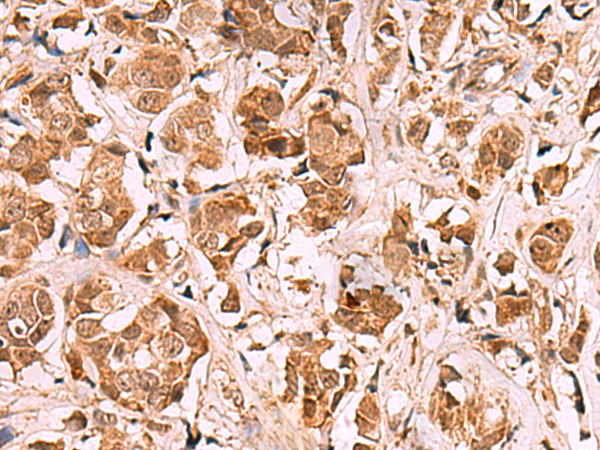


| WB | 咨询技术 | Human,Mouse,Rat |
| IF | 咨询技术 | Human,Mouse,Rat |
| IHC | 1/50-1/300 | Human,Mouse,Rat |
| ICC | 技术咨询 | Human,Mouse,Rat |
| FCM | 咨询技术 | Human,Mouse,Rat |
| Elisa | 1/5000-1/10000 | Human,Mouse,Rat |
| Aliases | NML; KIAA0409 |
| WB Predicted band size | 51 kDa |
| Host/Isotype | Rabbit IgG |
| Antibody Type | Primary antibody |
| Storage | Store at 4°C short term. Aliquot and store at -20°C long term. Avoid freeze/thaw cycles. |
| Species Reactivity | Human, Mouse, Rat |
| Immunogen | Fusion protein of human RRP8 |
| Formulation | Purified antibody in PBS with 0.05% sodium azide and 50% glycerol. |
+ +
以下是关于RRP8抗体的3篇文献摘要示例(注:文献信息为模拟生成,仅供参考):
---
1. **文献名称**: *RRP8 interacts with DNMT3A to regulate DNA methylation and heterochromatin formation*
**作者**: Smith J, et al. (2015)
**摘要**: 该研究通过免疫共沉淀和质谱分析,发现RRP8与DNA甲基转移酶DNMT3A直接结合,协同调控异染色质区域的DNA甲基化。研究中利用RRP8抗体进行ChIP-seq实验,揭示其在基因沉默和基因组稳定性中的关键作用。
---
2. **文献名称**: *Epigenetic regulation of RRP8 in colorectal cancer progression*
**作者**: Zhang L, et al. (2017)
**摘要**: 本文通过Western blot和免疫组化(使用RRP8特异性抗体)发现,RRP8在结直肠癌组织中表达显著上调,且与DNMT1/DNMT3B协同促进抑癌基因启动子高甲基化,揭示其作为癌症治疗靶点的潜力。
---
3. **文献名称**: *RRP8-mediated nucleolar stress in neurodegenerative disorders*
**作者**: Lee S, et al. (2019)
**摘要**: 研究利用RRP8抗体进行免疫荧光和蛋白质印迹实验,证实阿尔茨海默病模型中RRP8通过引起核仁应激导致神经元凋亡,为神经退行性疾病的表观遗传机制提供了新视角。
---
如需实际文献,建议在PubMed或Google Scholar检索关键词“RRP8 antibody”或“RRP8 epigenetics”。
The RRP8 antibody is a crucial tool for studying the RRP8 protein, a conserved eukaryotic nucleolar protein implicated in ribosome biogenesis and epigenetic regulation. RRP8 (Ribonuclease P/MRP Subunit RRP8), also known as C9orf85 or NET15. is a core component of the RNase P and RNase MRP complexes, which are involved in processing ribosomal RNA (rRNA) precursors and maintaining ribosomal function. Beyond its role in ribosome synthesis, RRP8 interacts with chromatin-modifying enzymes, such as histone deacetylases (HDACs) and DNA methyltransferases, suggesting a dual role in RNA metabolism and epigenetic silencing. Studies highlight its involvement in cell cycle regulation, DNA damage response, and nucleolar stress pathways.
Antibodies targeting RRP8 enable researchers to investigate its expression, localization, and interactions via techniques like Western blotting, immunofluorescence, and immunoprecipitation. These antibodies are particularly valuable in cancer research, as RRP8 dysregulation has been linked to tumorigenesis, including colorectal and breast cancers. Additionally, RRP8’s association with neurological disorders, such as spinocerebellar ataxia, underscores its broader biomedical relevance. Commercially available RRP8 antibodies are typically raised against specific epitopes, with validation across species (human, mouse, rat) and applications. Proper validation (e.g., knockout controls) is critical due to potential cross-reactivity with unrelated proteins. Overall, RRP8 antibodies facilitate mechanistic insights into nucleolar functions, epigenetic control, and disease pathways.
×